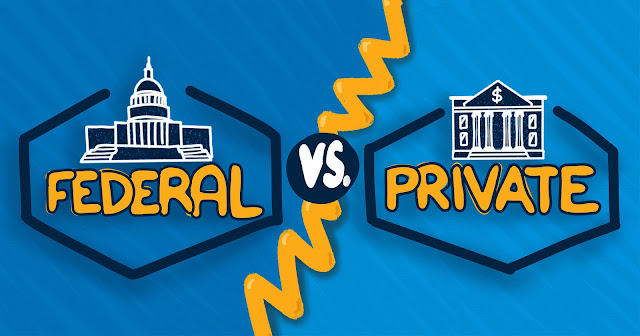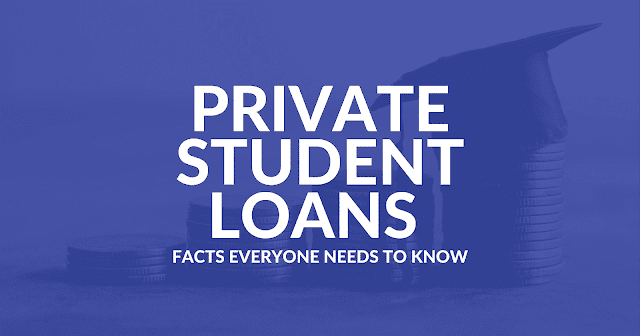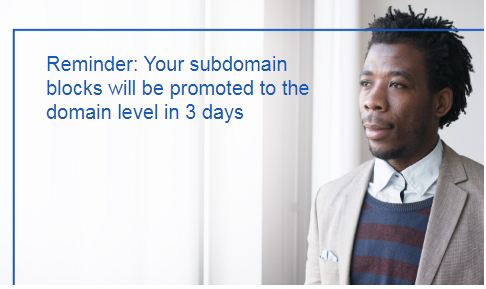what happens when you default on a private student loan
Introduction:
Private student loans are a common way to
finance higher education in the United States. However, when borrowers default
on these loans, the consequences can be severe. In this article, we will
explore what happens when you default on a private student loan.
What is a Private Student Loan?
A private student loan is a type of loan
that is issued by a private lender, such as a bank or a credit union, to help
students pay for college or graduate school. These loans are different from
federal student loans, which are issued by the government.
When you take out a private student loan,
you agree to repay the loan with interest over a set period of time. The terms
of the loan will vary depending on the lender, but typically, private student
loans have higher interest rates and less flexible repayment options than federal
student loans.
What Happens When You Default on a Private Student Loan?
Defaulting on a private student loan can
have serious consequences. Here are some of the things that can happen when you default on a loan:
Your Credit Score Will Be Damaged
When you default on a private student
loan, your credit score will be negatively impacted thhough this happen. This can make it difficult
for you to get approved for other loans or credit cards in the future. In some
cases, defaulting on a private student loan can also hurt your chances of
getting a job, as some employers check credit scores as part of the hiring
process.
You Will Face Collection Efforts
When you default on a private student
loan, the lender will likely begin collection efforts. This may include sending
you letters and making phone calls to try to collect the debt. If you continue
to ignore the lender's attempts to collect the debt, they may take legal action
against you.
Your Wages Could Be Garnished
If the lender takes legal action against
you and obtains a judgment, they may be able to garnish your wages. This means
that a portion of your paycheck will be withheld and sent to the lender to
repay the debt.
Your Tax Refund Could Be Seized
If you default on a private student loan,
the lender may be able to seize your tax refund. This is known as a tax refund
offset, and it can happen if you owe money to the federal government, state
government, or a private lender.
Your Co-Signer Could Be Held Liable
If you have a co-signer on your private
student loan, they could be held liable for the debt if you default. This means
that the lender could go after the co-signer for the money owed.
Your Loan Could Be Sent to Collections
If the lender is unable to collect the
debt from you, they may send your loan to a collection agency. This can further
damage your credit score and make it even more difficult for you to get
approved for other loans or credit cards in the future.
what is the difference between private student loan and other loan?

Private student loans are a type of loan
specifically designed to help students pay for college or graduate school. They
are issued by private lenders, such as banks or credit unions, and typically
have higher interest rates and less flexible repayment options than federal
student loans.
Other types of loans, such as personal
loans or auto loans, are not specifically designed for educational expenses.
They can be used for a variety of purposes, such as home repairs, medical
bills, or purchasing a car. These loans are also issued by private lenders, but
their interest rates and repayment terms may vary depending on the lender and
the borrower's creditworthiness.
One key difference between private
student loans and other types of loans is that private student loans usually
require a co-signer. This is because most college students do not have an
established credit history or income, so lenders require a co-signer to
guarantee that the loan will be repaid.
Another difference is that federal
student loans offer more flexible repayment options, such as income-driven
repayment plans, loan forgiveness programs, and deferment or forbearance
options. Private student loans may offer some of these options, but they are
not required to do so.
Overall, private student loans are a
specific type of loan designed to help students pay for college or graduate
school, while other types of loans can be used for a variety of purposes.
Conclusion:
In conclusion, defaulting on a private
student loan can have serious consequences. Your credit score will be damaged,
you will face collection efforts, your wages and tax refund could be garnished
or seized, your co-signer could be held liable, and your loan could be sent to
collections. It's important to make every effort to repay your private student
loans on time to avoid these consequences.
FAQ’s
Q: What does it mean to default on a private student loan?
A: Defaulting on a
private student loan means that you have failed to make payments on the loan as
agreed upon in the loan agreement. Typically, you are considered to be in
default after 90 days of non-payment.
Q: What happens if I miss a payment on my private student loan?
A: If you miss a
payment on your private student loan, your lender will likely begin collection
efforts, such as sending you letters and making phone calls to try to collect
the debt. You may also be charged late fees or penalties.
Q: Can I go to jail for defaulting on a private student loan?
A: No, you cannot go
to jail for defaulting on a private student loan. However, the lender may take
legal action against you, which could result in wage garnishment, seizure of
tax refunds, or other consequences.
Q: Will defaulting on a private student loan affect my credit score?
A: Yes, defaulting on
a private student loan will negatively impact your credit score. This can make
it difficult for you to get approved for other loans or credit cards in the
future.
Q: Can a private student loan lender garnish my wages if I default on the loan?
A: Yes, if the lender
takes legal action against you and obtains a judgment, they may be able to
garnish your wages. This means that a portion of your paycheck will be withheld
and sent to the lender to repay the debt.
Q: What should I do if I am struggling to make payments on my private student loan?
A: If you are
struggling to make payments on your private student loan, you should contact
your lender as soon as possible. They may be able to offer you a repayment plan
or other options to help you avoid defaulting on the loan.
Q: How long will a default on a private student loan stay on my credit report?
A: A default on a
private student loan will stay on your credit report for seven years. This can
make it difficult for you to get approved for other loans or credit cards in
the future.
Related Articles
- AllstateComprehensive Insurance Coverage: What It Covers
- Metromile Insurance Claims and phone number
- Kin Insurance Florida: The Pros and Cons
- Everything You Need to Know About Debt Consolidation loan
- American Mortgage Consultants News What It Is and How It Works
- homeloan calculator | what is homeloan
- What isF1 formula 1 news for f1







